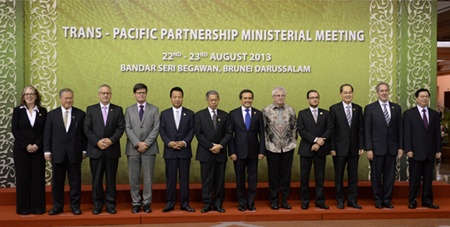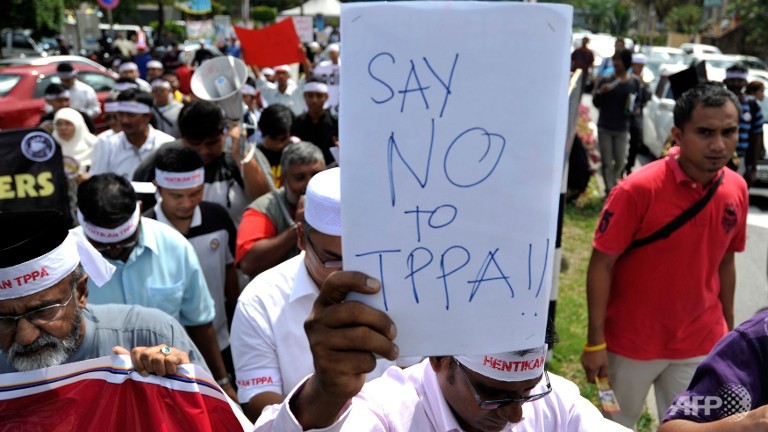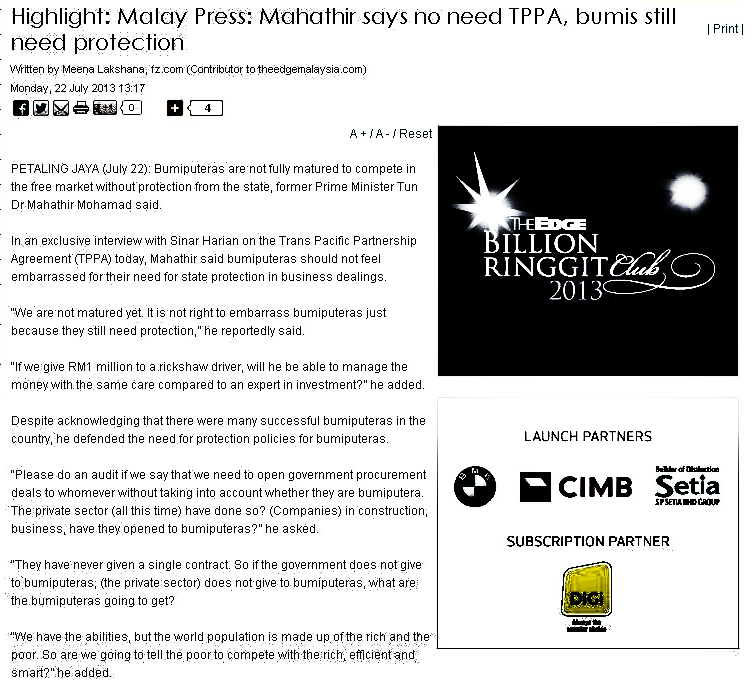TPP交渉は決裂しそうだ。『日本経済新聞』(2013年8月31日付)は、〈知財権をめぐっては、医薬品データや著作権の保護期間について米国と新興国の対立が激しい。米国主導でつくった協定の原案に新興国から異論が噴出し、両者に歩み寄る様子は見えない。
環境については、米国がさまざまな環境保護の国際条約に沿った厳しい基準の導入を要求し、新興国が反発しているようだ。競争政策では、市場で優位に立つ国有企業の定義や規制の方法について、意見がまとまらないという〉と報じた。
また、同日付『産経新聞』も次のように書いた。
〈今会合で対立が鮮明になったのが、「競争」分野で扱われる国有企業の扱いだ。米国は民間企業との公平な競争条件の確保を提案。国有企業への補助金全廃なども含まれるとみられ、マレーシアは会合で「懸念を表明した」(ジャヤシリ首席交渉官)。国有企業の多いベトナムも反対している。…米国が投資家保護策として導入を目指す「国家と投資家の紛争解決(ISDS)条項」に対しても、マレーシア、ベトナムの両国は反発する。
また、関税減免の対象になる製品の基準を決める「原産地規則」では、繊維製品をめぐり米国とベトナムの対立が根深い。米国は原材料の綿花から糸や布、衣料品までTPP域内でつくられた製品のみで関税撤廃すべきだと主張する〉
APECは先進国と途上国の対立で機能停止に陥ったが、TPPもまた合意できないまま、機能停止になる運命のようだ。
「TPP」カテゴリーアーカイブ
マレーシア、TPP離脱の可能性も
マハティール元首相がTPPに対する警戒論を繰り返す中で、マレーシア政府がTPPから離脱する可能性も出てきた。2013年8月28日付の『The Malaysian Reserve』は、「Malaysia may review TPP move」と題して次のように報じた。
Malaysia will review its commitment to the controversial Trans Pacific Partnership (TPP) agreement if studies it has commissioned find that the regional free trade agreement (FTA) is detrimental to sections of the Malaysian economy.
Minister of International Trade and Industry Datuk Seri Mustapa Mohamed said following stiff opposition by Malaysian groups, the government has commissioned two studies to weigh the pros and cons of Malaysia joining the TPP.
He said the government will make a decision based on the findings of the two studies.
続きを読む マレーシア、TPP離脱の可能性も
TPP年内妥結の虚構
台頭するマレーシアのTPP反対論
マハティール元首相が『New Straits Times』(7月12日)に掲載された記事でTPP反対論を展開して以来、マレーシアでTPP反対論が強まりつつある。
8月7日には『Free Malaysia Today』が、次のようにTPP反対派の急増を報じている。
Debunking TPPA myths
The idea that it may have been better for Malaysia to stay out of TPP negotiations is a myth that needs to be debunked through a fact based cost/benefit analysis.
It seems that increasingly more and more people in Malaysia ‘love to hate’ the Trans-Pacific Partnership (TPP) project. An unlikely alliance appears to be emerging between former prime minister Dr Mahathir Mohamad and members of opposition on this issue.
This could potentially harm Malaysia’s interest if as a result of this pressure it is forced to abandon its efforts to be part of the groundbreaking trade pact.
In my personal view Malaysia is absolutely right to enter the trade negotiations with 12 Pacific nations to defend its own economic interests within TPP. 続きを読む 台頭するマレーシアのTPP反対論
マレーシアでも高まるTPP反対論
ムサ・ヒタム元副首相もTPP慎重論
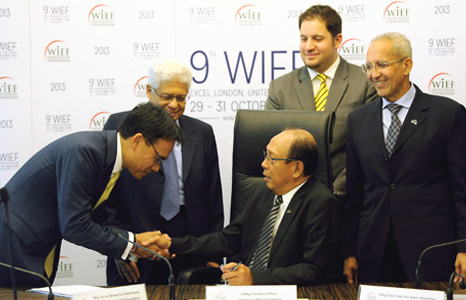 マレーシアではマハティール元首相がTPP反対論を唱えたのに続いて、現在世界イスラム経済フォーラム財団理事長を務めるムサ・ヒタム元副首相もTPP慎重論を唱えている。
マレーシアではマハティール元首相がTPP反対論を唱えたのに続いて、現在世界イスラム経済フォーラム財団理事長を務めるムサ・ヒタム元副首相もTPP慎重論を唱えている。
The Malaysian Reserve(2013年7月23日)に掲載された記事を転載させていただく。
World Islamic Economic Forum (WIEF) Foundation chairman Tun Musa Hitam says the Malaysian government should not rush into the proposed Trans Pacific Partnership (TPP) agreement without wider consultation.
He said this will calm down the anxiety surrounding the secretive trade pact and reassure the critics of TPP.
Musa said at present it looks like the TPP deal is being done in haste without engaging Malaysians in this important issue.
“I agree that in an exercise of that nature, there is need for in-depth and widespread process of discussions on where this thing will take us and what it is all about,” he said.
He said Malaysians need to know what will be the real impact of the TPP on the country that has not been pursued by the government.
“Now that there are doubts about the TPP, I think the government need to put things right. It is not enough for the authorities to parrot the official statements that this is in the interest of Malaysia,” he said to the media at the WIEF office yesterday.
“There needs to be widening of the parties involved and those that has relevance with the TPP. If you try to identify, you will see that everybody is affected by the TPP,” he said.
There are a lot of allegations and if these are all true, it will be very bad for our country but I do not really know how bad it will be, he said, adding that he is not commenting as WIEF chairman on this issue.
マハティール元首相のTPP反対論を報じないマスコミ
TPPに反対するマハティール元首相
マレーシアでのTPP交渉を3日後に控えた2013年7年12月、マハティール元首相がついにTPP反対論を唱えるに至った。
マハティール元首相は、同日の『New Straits Times』に「TPP will be another bad pact」と題して寄稿した。以下に転載する。
UNEQUAL PARTNERS: The Trans-Pacific Partnership Agreement will allow big economies to plunder smaller ones
THE secretary-general of the International Trade and Industry Ministry avers that trade negotiations must be done in secret, I suppose by the officers concerned. There should apparently be no public debate, even within the government.
I don’t think it is such a good practice, if indeed that is the practice. Let us see the record of trade and other agreements negotiated by the Malaysian government. They do not seem to favour Malaysia much. In fact they seem to result in Malaysia accepting unfavourable terms. 続きを読む TPPに反対するマハティール元首相
佐々木実「竹中平蔵氏の正体」英訳
 以下は、『月刊日本』2013年7月号に掲載された佐々木実氏のインタビュー記事「竹中平蔵氏の正体」の全文英訳です。
以下は、『月刊日本』2013年7月号に掲載された佐々木実氏のインタビュー記事「竹中平蔵氏の正体」の全文英訳です。
A True Picture of Heizo Takenaka
Minoru Sasaki, journalist
Heizo Takenaka as Seeker of Regulatory Reform in the Field of Labor
NIPPON: In your book Shijo to kenryoku [Markets and Power] (Kodansha), you focus on depicting the real Heizo Takenaka. The book is full of suggestions for people who wonder just how it was that neoliberalism came to be introduced to Japan.
SASAKI: Takenaka said at the first meeting of the Industrial Competitiveness Council (ICC) on January 23, 2013, that “there is no magic wand for growth strategy; regulatory reform that gives corporations freedom and makes them more muscular is the first element of growth strategy.” The following day, Prime Minister Shinzo Abe proclaimed the necessity of regulatory reform using a manner of speaking that followed Takenaka’s statement almost to the letter. It was a scene that was symbolic of the closeness between Prime Minister Abe and Takenaka.
Takenaka had played a major role during the years of the Koizumi administrations. He was subsequently the subject of various criticisms, and during the years of the Democratic Party of Japan administration it seemed for a moment that he might have become a has-been. However, he survived, was picked up by Prime Minister Abe, and is now the leading neoliberal ideologist.
「マハティールに見捨てられる日本」全文英訳
以下は、『月刊日本』平成25年4月号に掲載された、稲村公望先生のインタビュー記事「マハティールに見捨てられる日本」の全文英訳です。
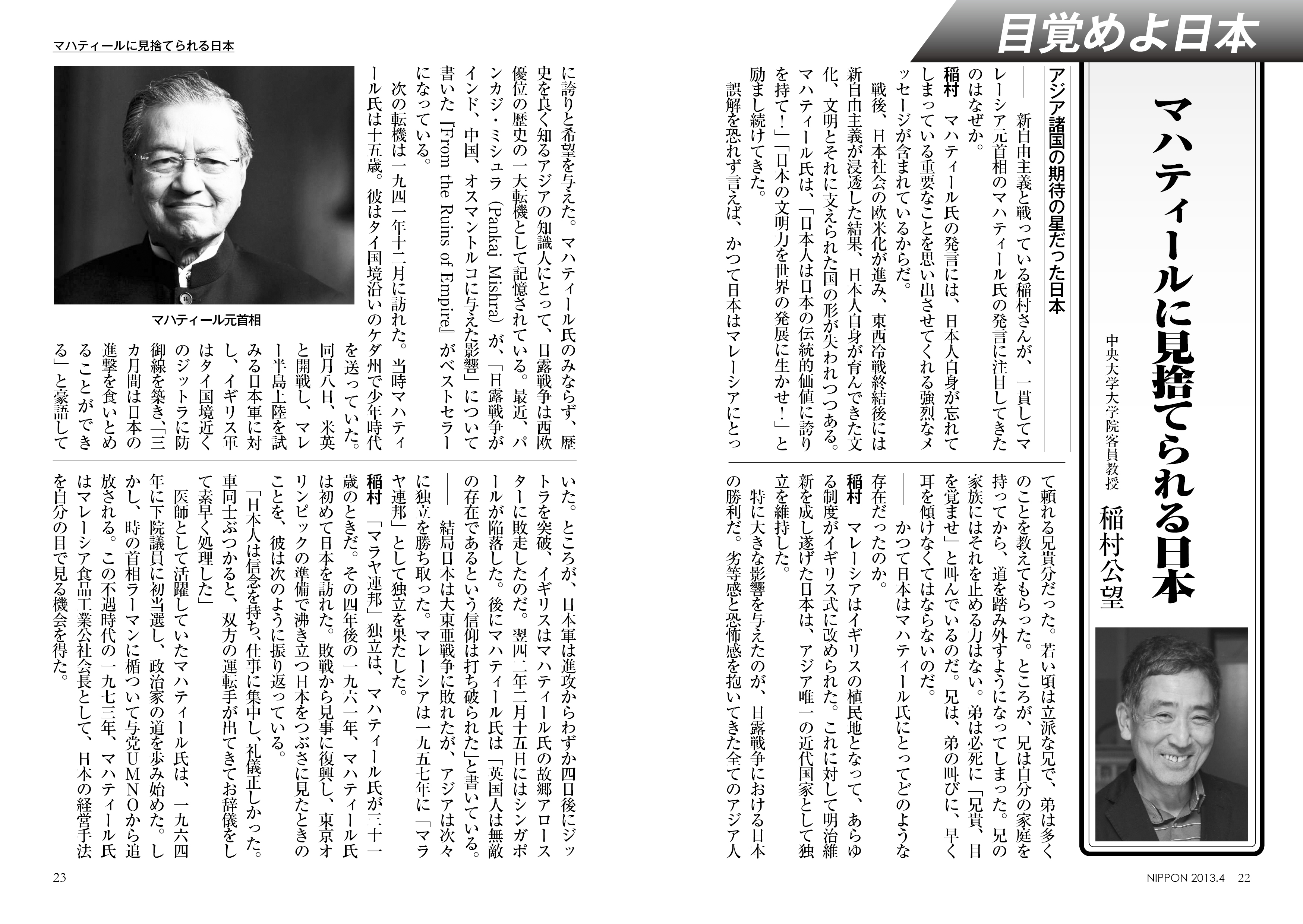
The Japan That Dr. Mahathir Abandoned (?!)
INAMURA Kobo, Visiting Professor, Graduate School, Chuo University
(This is an excerpt from the April 2013 issue of Gekkan Nippon magazine.)
Japan, once the up-and-coming star for the countries of Asia
NIPPON: As someone who has struggled against neoliberalism, why is it that you have long taken note of the things that former Malaysian Prime Minister Dr. Mahathir has to say?
INAMURA: It’s because Dr. Mahathir’s words have included a strong message that can make we Japanese remember something important that we ourselves have forgotten.
Japanese society westernized after the war, and neoliberalism took hold with the end of the Cold War. As a result, the culture and civilization that the Japanese people themselves developed, along with the shape of the country supported by them, has been disappearing. Dr. Mahathir constantly offered words of encouragement: “Japanese, take pride in Japan’s traditional values!” “Use the power of Japanese civilization to develop the world!”
If I could speak without fear of being misunderstood, I would say that at one time Japan was like the big brother on which Malaysia could depend. In their younger days, it was a splendid older brother, and the younger brother learned many things. Once the older brother got his own household, however, he strayed from the path. His family didn’t have the power to stop it. The younger brother frantically cried out, “Brother, open your eyes!” The older brother should have quickly taken note of his younger brother’s strenuous cries.
続きを読む 「マハティールに見捨てられる日本」全文英訳

